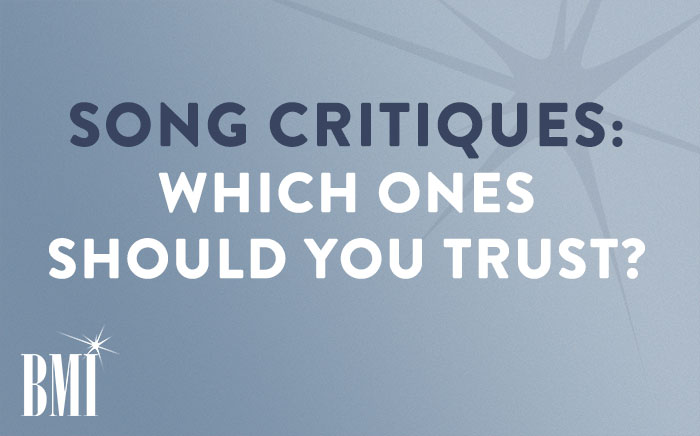Song Critiques: Which Ones Should You Trust?

One of the most popular aspects of my songwriting workshops are the song critiques. They provide an opportunity for writers to get objective feedback on their songs; a chance to learn what’s working—and what could be stronger. In most cases, I suggest changes, so ideally, the time to get a critique is before spending significant time and/or money on creating a demo. It seems that the more time and money we invest in our songs, and the more time we spend listening to our demos (and having friends tell us how great they sound) the less likely we are to revise them.
It’s awesome to get glowing reviews from our mothers, spouses, friends and others. But unless our friends and family are music publishers, A & R reps, or other music business professionals, it is unlikely they are qualified to provide feedback we can trust regarding how well our songs stack up against the competition—and what we might do to improve them. The solution: having our songs critiqued by industry pros. A fresh pair of eyes and ears can be the ticket to taking our songs to the next level.
When I critique a song, my hope is that some of my comments will resonate with the writer, and his or her response will be, “I agree! I see exactly why you’re saying that.”
But what if you disagree with the feedback? What if a reviewer hates your title or your favorite line of lyric—the one that compelled you to write the song in the first place? What if they say the melody that you can’t get out of your head is less than memorable? How can we discern whether the problem is our song, or if we are suffering from a case of songwriter myopia, a common affliction that prevents us from being able to assess our work objectively? Evaluating our own songs is difficult at best. After all, we know what our lyrics mean, and we’ve listened to our melodies enough times for them to burn into our brains.
So how can we know who to trust with our precious babies? And how can we know when we genuinely need to change something? If you are receiving a critique in a group setting, and you agree with the evaluations and suggestions for almost all the other songs, the chances are low that the reviewer is only off base when it comes to your song. In situations where your song is the only one being evaluated, examine the reviewer’s credentials. Are they well-versed in the genre you are targeting? Do you know writers who can vouch for the critiquer’s effectiveness?
It’s helpful to differentiate between subjective opinions and comments that clearly identify weaknesses in our work. “I just don’t like it,” or “It doesn’t sound like a hit,” are personal opinions. But some issues that might be addressed in a critique are specific and easier to assess. Listen for observations such as:
“The poetic approach of this line is inconsistent with the conversational tone of the rest of the lyric.”
“Your chorus has the exact same melody as your verse.”
“Your bridge fails to take the song to a next level—melodically or lyrically.”
“I’ve listened to your chorus five times and I’m still unable to sing it back because the melody changes with every line.”
“Your second verse is comprised of seven musical bars and that feels jarring.”
You have crammed in extra syllables and the melody of your first verse is different from your subsequent verses.”
“Rhyming ‘love’ and ‘the stars above’ is cliché. The line needs to be more original.”
Having our work placed under a microscope is scary and hearing that aspects of it fail to measure up can be terribly disappointing, even devastating. I’ll tell you a secret; after having more than 1,000 of my songs critiqued by publishers and co-writers, I still feel like I’ve been kicked in the stomach when I’m asked to change something. It’s even worse if the song is simply rejected.
That said, having a publisher critique one of my early songs and encourage me to bring in a collaborator, and rewrite that same song seven times, opened the door to my success. It felt horrible when he told me I needed a stronger opening line of lyric; a more effective second verse; and a catchier melody. But each time my song was torn apart, I gritted my teeth, went back to the drawing board, and brought it one step closer to becoming the chart single it eventually became. Now I’ve come to regard critiques as nasty tasting medicine. Sometimes, it’s hard to swallow, but I’m willing to endure the temporary unpleasantness in order to help my songs get better.
After receiving a critique, give yourself a day or two to process the information. Remind yourself that it’s your song—not you—that is being judged. When the initial sting has worn off, if you still feel the input is off base, seek additional opinions. If multiple professionals deliver the same feedback, it’s unlikely that this is a coincidence. Make the suggested revisions, and if you don’t prefer the rewritten song, I hereby grant you permission to go back to your original version. Ultimately, we need to please ourselves.
* * *
Jason Blume is the author of 6 Steps to Songwriting Success, This Business of Songwriting, and Inside Songwriting (Billboard Books). His songs are on Grammy-nominated albums and have sold more than 50,000,000 copies. He has been teaching the BMI Nashville Songwriters’ Workshops for more than 25 years, and has been a guest lecturer at the Liverpool Institute for Performing Arts (co-founded by Sir Paul McCartney) and at the Berklee School of Music. For information about his workshops, webinars, instructional audio lectures, additional articles, and more, visit www.jasonblume.com






Community
Connect with BMI & Professional Songwriters